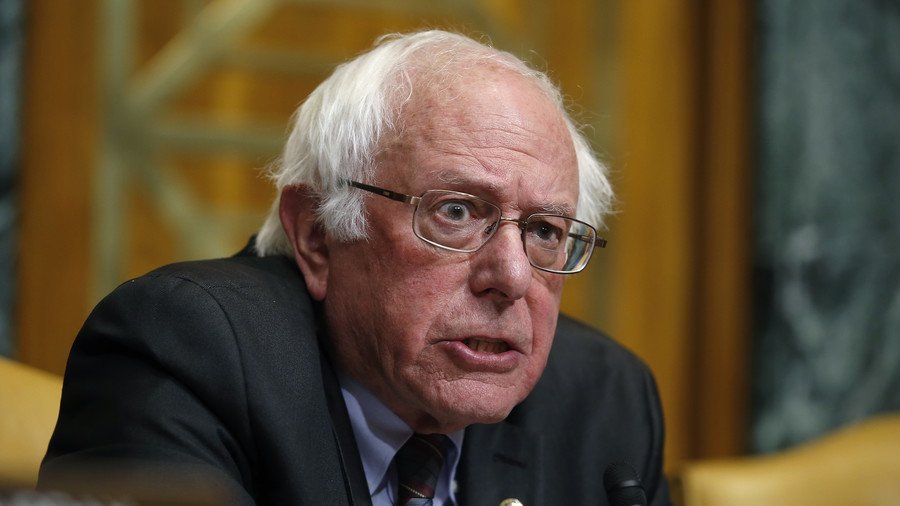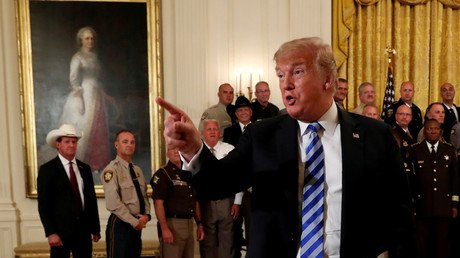Bernie Sanders proposes ‘Stop BEZOS’ bill to end corporate welfare, boost wages

Vermont Democratic Senator Bernie Sanders has unveiled his new ‘Stop BEZOS’ Act, a pointed jab at the Amazon CEO, which ostensibly aims to entirely eliminate one kind of corporate welfare in the US.
The proposed bill would target companies with 500 or more employees, including some of America’s largest corporations such as Amazon, Apple and Walmart.
The Stop Bad Employers by Zeroing Out Subsidies Act (or the ‘Stop BEZOS’ Act) would impose a 100 percent tax on companies equal to the amount of money the companies’ employees receive from federal welfare programs such as food stamps or Medicaid. It would apply to both full and part-time employees as well as independent contractors.
WATCH LIVE: Introducing the Stop Bad Employers by Zeroing Out Subsidies (BEZOS) Act https://t.co/wNqiNLaQ7l
— Bernie Sanders (@SenSanders) September 5, 2018
“I think it is fair to say the American people are tired of having to subsidize the wealthiest people in this country who are paying wages that are just so low that people can’t get by,” Sanders said at a press conference. “Our legislation gives large, profitable employers a choice: Pay workers a living wage, or pay for the public assistance programs their low-wage employees are forced to depend on.”
Sanders claimed that such corporate welfare costs the American taxpayer $150 billion a year, citing a study by the University of California Berkeley Labor Center. The ‘Stop BEZOS’ Act and its House of Representatives counterpart, the Corporate Responsibility and Taxpayer Protection Act, were introduced Wednesday by Sanders (I-VT) and Rep. Ro Khanna (D-CA) respectively. Khanna introduced a similar bill last year which failed.
Amazon CEO Jeff Bezos boasts a net worth of about $168 billion and saw his company reach $1 trillion in market cap on Tuesday. “The taxpayers in this country should not be subsidizing a guy who’s worth $150 billion, whose wealth is increasing by $260 million every single day,” Sanders told TechCrunch in an earlier interview.
Despite Bezos having his name on the bill, McDonald’s and Walmart, and not Amazon, had the most employees on food stamps according to an analysis by New Food Economy. Walmart announced in January that it would raise its minimum wage from $9 to $11.
In addition, Amazon workers’ median annual salary last year was $28,446, but this figure includes both full and part-time employees. For full-time employees alone, the median income at Amazon is $34,123.
Sanders himself has been accused of hypocrisy because he paid his staff interns $12 an hour while campaigning for a “livable wage” of $15 per hour. “As I am sure you know, with my very strong support, the state legislature voted to raise the minimum wage to $15 an hour. Our Republican governor vetoed the the measure,” Sanders said in response to this criticism, as cited by the Independent.
READ MORE: Feeling the Bern? Amazon pushes back against Sanders' crusade against retail giant
Amazon, aware of the Vermont senator’s plans to launch such a bill, pre-empted the announcement in an August blog post.
“Senator Sanders continues to spread misleading statements about pay and benefits. Amazon is proud to have created over 130,000 new jobs last year alone,” Amazon said.
“In addition to highly competitive wages and a climate controlled, safe workplace, Amazon provides employees with a comprehensive benefit package including health insurance, disability insurance, retirement savings plans, and company stock.”
In response to Sanders’ request for Amazon workers’ stories of hardship, Amazon Senior Vice President Dave Clark also encouraged workers to share their stories to help clarify the truth about working conditions at the company.
Like this story? Share it with a friend!















